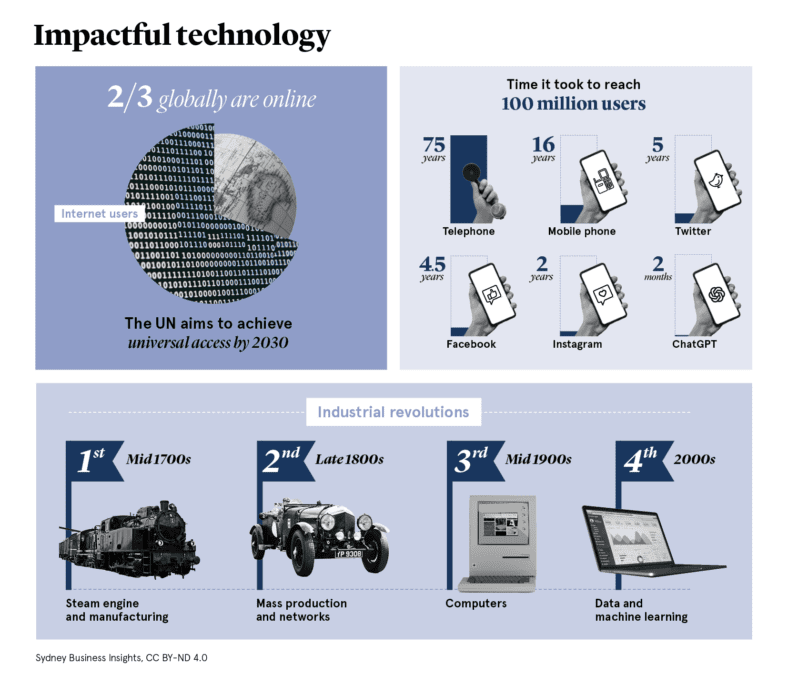It took the telephone 75 years to reach 100 million users. The mobile phone got there within 16 years, Twitter in five, Facebook in four and a half. Instagram took two years, and ChatGPT landed its 100th million user in just two months.
In this, the Fourth Industrial Revolution, Impactful Technology is transforming the way we work, think, and live our lives. The pace of change of this megatrend is astonishing.
At the start of this century, barely 3% of the world’s population were connected to the internet. Around two thirds are now online, and it is one of the United Nations’ SDGs to achieve universal access by 2030.
Already this century’s innovation list is long: artificial intelligence, advanced robotics, drones, smart devices, 3D printing, cloud computing, blockchain technologies, virtual and augmented reality, apps and social platforms, commercial space technology, and the unfolding possibilities of CRISPR and gene editing.
Generative AI is the next general-purpose technology, as transformative as the personal computer, the internet, and the mobile phone. It will impact every sector of the economy, and those who engage creatively with generative AI will be the leaders in their field.
The market for AI is expected to grow by twenty times across this decade, reaching almost two trillion US dollars by 2030.
Impactful technology also poses significant practical and ethical challenges:
How should big tech be regulated, considering they now control information flows and communication infrastructures across the world?
Where should we draw the line between enhanced products and services, and our right to privacy?
Gene editing promises a means to cure blindness, but can we avoid the desire to create the ‘perfect’ baby?
Who will be the winners and losers in job automation?
The challenge for governments, corporations and leaders will be to ensure that these new technologies reach their potential, while being accessible, equitable, and socially beneficial.
Kemp, S. (2023). Digital 2023: Global Overview Report, Data Reportal. Available at: https://datareportal.com/reports/digital-2023-global-overview-report
United Nations’ International Telecommunication Union (ITU) (2022). ‘New UN Targets Chart Path to Universal Meaningful Connectivity’. Available at: https://www.itu.int/hub/2022/04/new-un-targets-chart-path-to-universal-meaningful-connectivity/
Thormundsson, B. (2023). ‘Global Artificial Intelligence Market Size 2021-2030’, Statista. Available at: https://www.statista.com/statistics/1365145/artificial-intelligence-market-size/
Hu, K. (2023). ‘ChatGPT sets record for fastest-growing user base’, Reuters 3/2/23. Available at:
https://www.reuters.com/technology/chatgpt-sets-record-fastest-growing-user-base-analyst-note-2023-02-01/
Livemint (2023). ‘Chat GPT’s meteorical rise – 100 million users in 2 months’, Mint 5/3/23. Available at:
https://www.livemint.com/technology/tech-news/chatgpts-meteorical-rise-100-million-users-in-2-months-11677997670518.html

We believe in open and honest access to knowledge. We use a Creative Commons Attribution NoDerivatives licence for our articles and podcasts, so you can republish them for free, online or in print.
Megatrends watch
Archive

Fairness control for risky artificial intelligence decision making
Exploring the balance between AI decision-making and human ethics leads to a critical question: How can we ensure fairness in AI's life-altering decisions?

Is Now and Then really a Beatles song? The fab four always used technology to create new music
The Beatles have released a new track - using new technology to strip Lennon’s vocals out of an old demo casette tape. Will this be part of Beatles canon?

AI chatbots are coming to your workplace but are not necessarily coming for your job
Chatbots are proving to be productive and useful but they can be unreliable and make mistakes.

Technology is changing the lives of female lawyers, in ways that are bad as well as good
A new survey finds working from home is removing barriers for women, but also blurring the barrier between work and the “safe space” of home.

Your car is watching you. The implications are profound and immediate
The issue of privacy breaches by car manufacturers is often overlooked.

VR is transforming how buildings are made
We no longer need to rely on the individual capability of people to read plans or imagine the spaces based on the pictures or verbal descriptions.

Australian consumers support better protections for gig workers
What is the quality, rather than the quantity, of the jobs that we wish to tolerate as a society?

Online scams are about to get more sophisticated than Nigerian princes
ChatGPT’s “evil cousin” WormGPT will allow bad actors to more accurately mimic the real deal in attempts to swindle and deceive people.









